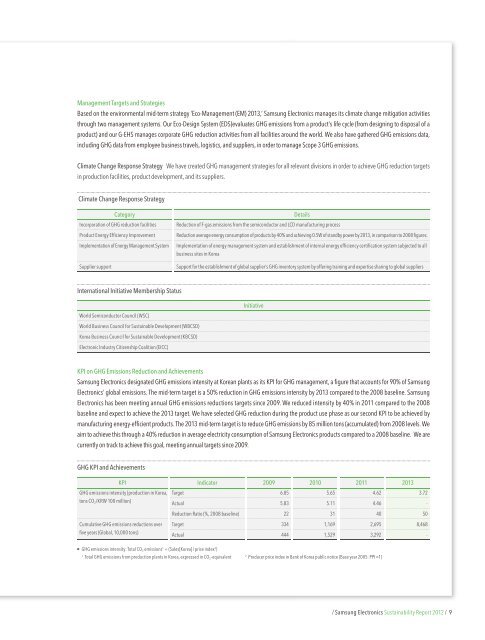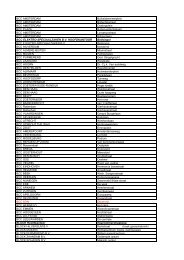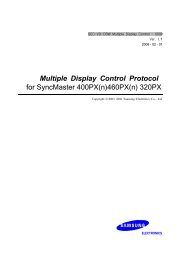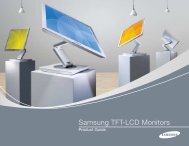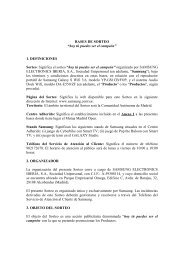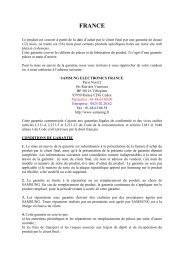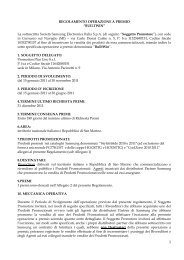2 / Samsung Electronics Sustainability Report 2012 /
2 / Samsung Electronics Sustainability Report 2012 /
2 / Samsung Electronics Sustainability Report 2012 /
Create successful ePaper yourself
Turn your PDF publications into a flip-book with our unique Google optimized e-Paper software.
Management Targets and Strategies<br />
Based on the environmental mid-term strategy ‘Eco-Management (EM) 2013,’ <strong>Samsung</strong> <strong>Electronics</strong> manages its climate change mitigation activities<br />
through two management systems. Our Eco-Design System (EDS)evaluates GHG emissions from a product’s life cycle (from designing to disposal of a<br />
product) and our G-EHS manages corporate GHG reduction activities from all facilities around the world. We also have gathered GHG emissions data,<br />
including GHG data from employee business travels, logistics, and suppliers, in order to manage Scope 3 GHG emissions.<br />
Climate Change Response Strategy We have created GHG management strategies for all relevant divisions in order to achieve GHG reduction targets<br />
in production facilities, product development, and its suppliers.<br />
Climate Change Response Strategy<br />
Category<br />
Incorporation of GHG reduction facilities<br />
Product Energy Effi ciency Improvement<br />
Implementation of Energy Management System<br />
Supplier support<br />
International Initiative Membership Status<br />
World Semiconductor Council (WSC)<br />
World Business Council for Sustainable Development (WBCSD)<br />
Korea Business Council for Sustainable Development (KBCSD)<br />
Electronic Industry Citizenship Coalition (EICC)<br />
Details<br />
Reduction of F-gas emissions from the semiconductor and LCD manufacturing process<br />
Reduction average energy consumption of products by 40% and achieving 0.5W of standby power by 2013, in comparison to 2008 fi gures.<br />
Implementation of energy management system and establishment of internal energy effi ciency certifi cation system subjected to all<br />
business sites in Korea<br />
Support for the establishment of global supplier’s GHG inventory system by offering training and expertise sharing to global suppliers<br />
Initiative<br />
KPI on GHG Emissions Reduction and Achievements<br />
<strong>Samsung</strong> <strong>Electronics</strong> designated GHG emissions intensity at Korean plants as its KPI for GHG management, a fi gure that accounts for 90% of <strong>Samsung</strong><br />
<strong>Electronics</strong>’ global emissions. The mid-term target is a 50% reduction in GHG emissions intensity by 2013 compared to the 2008 baseline. <strong>Samsung</strong><br />
<strong>Electronics</strong> has been meeting annual GHG emissions reductions targets since 2009. We reduced intensity by 40% in 2011 compared to the 2008<br />
baseline and expect to achieve the 2013 target. We have selected GHG reduction during the product use phase as our second KPI to be achieved by<br />
manufacturing energy-effi cient products. The 2013 mid-term target is to reduce GHG emissions by 85 million tons (accumulated) from 2008 levels. We<br />
aim to achieve this through a 40% reduction in average electricity consumption of <strong>Samsung</strong> <strong>Electronics</strong> products compared to a 2008 baseline. We are<br />
currently on track to achieve this goal, meeting annual targets since 2009.<br />
GHG KPI and Achievements<br />
KPI<br />
Indicator<br />
GHG emissions intensity (production in Korea, Target<br />
tons CO2/KRW 100 million)<br />
Actual<br />
Reduction Ratio (%, 2008 baseline)<br />
Cumulative GHG emissions reductions over Target<br />
fi ve years (Global, 10,000 tons)<br />
Actual<br />
2009<br />
6.85<br />
5.83<br />
22<br />
334<br />
444<br />
2010<br />
5.65<br />
5.11<br />
31<br />
1,169<br />
1,529<br />
2011<br />
4.62<br />
4.46<br />
40<br />
2,695<br />
3,292<br />
GHG emissions intensity: Total CO2 emissions1 ÷ (Sales[Korea] / price index 2 )<br />
1 2 Total GHG emissions from production plants in Korea, expressed in CO2-equivalent Producer price index in Bank of Korea public notice (Base year 2005: PPI=1)<br />
2013<br />
3.72<br />
/ <strong>Samsung</strong> <strong>Electronics</strong> <strong>Sustainability</strong> <strong>Report</strong> <strong>2012</strong> / 9<br />
-<br />
50<br />
8,468<br />
-


